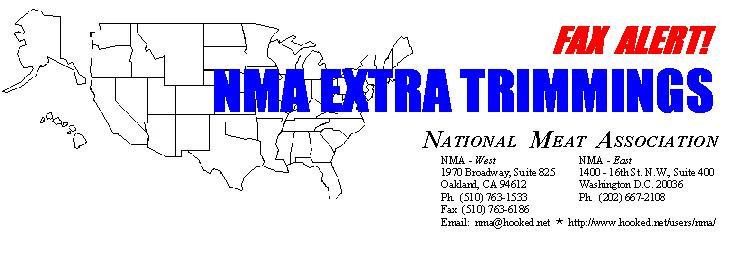

To: All General Members
Fr: Rosemary Mucklow
NMA Executive Director
Re: HACCP Implementation Due Process Issue January 5, 1998
In its implementation plans presented at last month�s Implementation Conference in Washington, DC, FSIS asserted the authority to indefinitely suspend establishment operations for alleged deficiencies in SSOP or HACCP implementation without appropriate notice and opportunity to remedy.
NMA consulted with its Washington, DC counsel, Olsson, Frank & Weeda, and then invited other groups to participate in a teleconference call on December 22. The organizations agreed in the teleconference to prepare a letter to Secretary Glickman on this issue, because of the unsatisfactory and inadequate nature of the responses we had received in the Implementation Conference.
This letter was finalized today and delivered to the Secretary�s office, with copies to Under Secretary Catherine Woteki and FSIS Administrator Tom Billy. A copy is enclosed for your information.
We urge you to provide a copy of the letter to your Congressman and Senators for information and urge their support. It is absolutely essential that the USDA, in exercising its authority under the Federal Meat Inspection Act and the Poultry Products Inspection Act, provide official establishments with appropriate appeal opportunities and due process rights.
We�d appreciate your follow-up. Happy New Year!
�
�
encl. . . .
�
January 5, 1998
�
The Honorable Daniel R. Glickman, Secretary of Agriculture
U.S. Department of Agriculture, Room 200-A, Whitten Building
14th & Independence Avenue, S.W., Washington, DC� 20250
�
�
Dear Mr. Secretary:
The undersigned organizations request that you immediately correct a serious problem in the Food Safety and Inspection Service's (FSIS) implementation of its new Hazard Analysis and Critical Control Point (HACCP) and Sanitation Standard Operating Procedure (SSOP) requirements for federally inspected meat and poultry establishments.� FSIS is asserting the authority to indefinitely suspend establishment operations for alleged deficiencies in SSOP or HACCP implementation without giving establishments adequate notice and opportunity to take corrective action and without providing notice and the opportunity for a hearing.� FSIS has no basis for such a fundamental departure from established principles of due process, and the agency's actions threaten to undermine support for its new inspection procedures.
FSIS is taking the position that, based upon its own review of an establishment's compliance history with SSOP or HACCP plans, it can conclude that a systems failure has occurred, and based upon that conclusion, suspend operations at a facility until it is satisfied that appropriate corrective measures have been taken.� This authority has been asserted in recent weeks by FSIS in its enforcement of SSOP requirements.� In addition, agency officials have repeatedly indicated, both in public meetings and in informal communications with our organizations, that they intend to operate in a similar manner in implementing HACCP which begins later this month.
Our organizations have strongly supported HACCP. Although we believe that most issues related to transition to the new system can and should be resolved through cooperative effort, we recognize that HACCP, like any other regulatory program, needs an enforcement component. Enforcement must take place, however, within an appropriate procedural framework.
In defense of their position, FSIS officials have asserted that an establishment is afforded an opportunity to be heard when a specific alleged deficiency is identified and documented.� This contention ignores the point, however, that in concluding that operations are to be suspended, FSIS makes a separate, independent judgment about when a series of alleged deficiencies rises to the level of an overall systems failure.� Also, current FSIS practices do not provide for adequate advance notice to an establishment that such action may be forthcoming unless specific corrective actions are taken.
FSIS has also stated that these issues might be addressed, at some later date, through Rules of Practice. When such rules are promulgated, they must provide procedural due process protections for all inspected establishments.� Prior to and independent from the development of such procedural rules, FSIS must provide the due process protections guaranteed by the Constitution.� At a minimum, this would include:
First, prior to withholding of the mark of inspection, the agency must provide written notice to the establishment specifying how its actions have not been effective in preventing non-compliance and specifying a time for additional measures to be implemented to avoid further regulatory actions.
Second, the establishment must have the right to dispute this notice, and no action should be taken to withhold the mark during such appeal, except in the event of an imminent hazard to health or to prevent the distribution of product shown to be adulterated.
Third, an appeal of a notice proposing to withhold the mark must be handled by the agency on an expedited basis through each level of the agency up to the Administrator.
Fourth, the establishment must have the right to appeal the Administrator's decision to withhold the mark to an Administrative Law Judge, and during the pendency of the proceeding, the use of the mark should not be withheld except in cases of imminent hazard to public health.
The agency has suggested that these procedural concerns are somehow overridden by public health considerations.� We do not contest the fact that the agency can act immediately when it determines there is a serious and imminent hazard to public health.� That concept has long been incorporated in our nation's food and drug laws.� However, when the agency cannot identify the existence of such a serious and imminent hazard to public health, it must provide appropriate notice, opportunity to correct alleged deficiencies� and an opportunity for hearing, prior to taking enforcement action to close a facility.
We therefore will appreciate receiving your written assurances that FSIS will not compromise our members' fundamental rights to due process.
Sincerely,
American Association of Meat Processors, American Meat Institute, Eastern Meat Packers Association, National Broiler Council, National Food Processors Association, National Meat Association, National Turkey Federation, North American Meat Processors, Southeastern Meat Association, Southwest Meat Association, U.S. Poultry and Egg Association